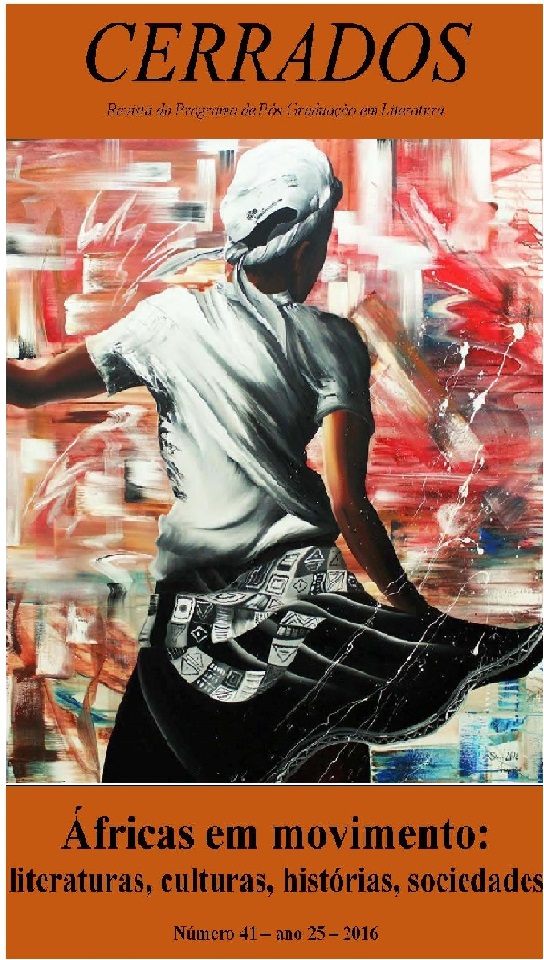Nação e identidade na literatura da Guiné-Bissau
Palavras-chave:
Guiné-Bissau. Abdulai Sila. Literatura. Identidade. Nação.Resumo
Com a conquista da independência política, a Guiné-Bissau assume a tarefa de formar-se como nação e construir sua identidade. Por acreditar que a literatura apresente relevante papel para essa realização, esta análise busca, por meio da trilogia de Abdulai Sila, ponderar como essa complexa construção se vem fundamentando. Os romances A última tragédia (1995), Eterna paixão (1994) e Mistida (1997), ao tratarem de diferentes períodos do território em questão, possibilitam uma apreciação abrangente e elucidativa. Assim, a nação e a identidade guineenses, ainda em processo de construção, já deixam entrever sua característica híbrida, na qual o tradicional e o moderno se conjugam e se entrelaçam.
Downloads
Referências
ABDALA JUNIOR, Benjamin. Literatura, história e política: literaturas de língua portuguesa no século XX. 2. ed. Cotia: Ateliê Editorial, 2007.
AUGEL, Moema Parente. O desafio do escombro: nação, identidades e pós-colonialismo na literatura da Guiné-Bissau. Rio de Janeiro: Garamond, 2007.
_____. A fundação simbólica e social da língua guineense na prosa e na poesia. África, escritas literárias: Angola, Cabo Verde, Guiné-Bissau, Moçambique, São Tomé e Príncipe.organizado por SECCO, Carmen Tindó; SALGADO, Maria Teresa; JORGE; Sílvio Renato (Org.). Rio de Janeiro: Editora UFRJ; Angola: UEA, 2010.
BAKHTIN, Mikhail. Marxismo e filosofia da linguagem: problemas fundamentais do Método Sociológico na Ciência da Linguagem. Trad.: Michel Lahud e Yara Frateschi Vieira com a colaboração de Lúcia Teixeira Wisnik e Carlos Henrique D. Chagas Cruz. 2. ed. São Paulo: Hucitec, 1981.
BERND, Zilá. Literatura e identidade nacional. 2. ed. Porto Alegre: Editora da UFRGS, 2003.
BHABHA, Homi K. O local da cultura. Tradução: Myriam Ávila, Eliana Lourenço de Lima Reis, Gláucia Renata Gonçalves. Belo Horizonte: Ed. UFMG, 1998.
CABRAL, Amílcar. Unidade e luta. Disponível em:
<http://www.didinho.org/amilcalcabral.html>. Acesso em: 10 mar. 2011a.
_____. Fundamentos e objectivos da libertação nacional em relação com a estrutura social. Disponível em: <http://www.didinho.org/amilcalcabral.html>. Acesso em: 10 mar. 2011b.
_____. O nosso partido e luta devem ser dirigidos pelos melhores filhos do nosso povo. Disponível em: <http://www.didinho.org/amilcalcabral.html>. Acesso em: 10 mar. 2011c.
CHABAL, Patrick; DALOZ Jean-Pascal. África camina: El desorden como instrumento político. Trad. Rolando Sánchez e Rogelio Saunders.. Barcelona: Edicions Bellaterra, 2001.
FANON, Frantz. Os condenados da terra. Trad. José Laurênio de Melo.. Rio de Janeiro: Civilização Brasileira, 1979.
HALL, Stuart. Da diáspora: identidades e mediações culturais. SOVIK, Liv (Org.). Tradução: Adelaine La Guardia Resende; Ana Carolina Escosteguy; Cláudia Álvares; Francisco Rüdiger; Sayonara Amaral. Belo Horizonte: Editora UFMG; Brasília: Representação da Unesco no Brasil, 2003.
_____. A identidade cultural na Pós-Modernidade. Trad. Tomaz Tadeu da Silva, Guacira Lopes Louro. 11. ed. Rio de Janeiro: DPA, 2006.
MEMMI, Albert. Retrato do colonizado precedido pelo retrato do colonizador. Trad. Roland Corbisier e Mariza Pinto Coelho. Rio de Janeiro: Paz e Terra, 1967.
PÉLISSIER, René. História da Guiné: portugueses e africanos na Senegâmbia ”“ 1841-1936. Tradução: Franco de Sousa. Volume I. Editorial Estampa. Lisboa, 1997.
_____. História da Guiné: portugueses e africanos na Senegâmbia ”“ 1841-1936. Trad. Franco de Sousa. vol. II. Lisboa: Editorial Estampa, 1997.
SCANTAMBURLO, Luigi. Dicionário do guineense volume I: introdução e notas gramaticais. Lisboa: Edições Colibri; Faspebi, 1999.
SEMEDO, Odete Costa. Guiné-Bissau: história, culturas, sociedade e literatura. Belo Horizonte: Nadyala, 2010.
SILA, Abdulai. A última tragédia. Bissau: Ku Si Mon Editora, 1995.
_____. Mistida. Bissau: Ku Si Mon Editora, 1997.
_____. Mistida (Trilogia). Praia ”“ Mindelo: Centro Cultural Português, 2002.
_____. O livro como arma: entrevista com Abdulai Sila. O Marrare, Rio de Janeiro, n. 13, ano 10, p. 161-168, 2o sem. 2010. Entrevista concedida a Érica Bispo.
Downloads
Publicado
Como Citar
Edição
Seção
Licença
Proibida a reprodução parcial ou integral desta obra, por qualquer meio eletrônico, mecânico, inclusive por processo xerográfico, sem permissão expressa do editor (Lei n. 9.610 de 19/2/1998 )



